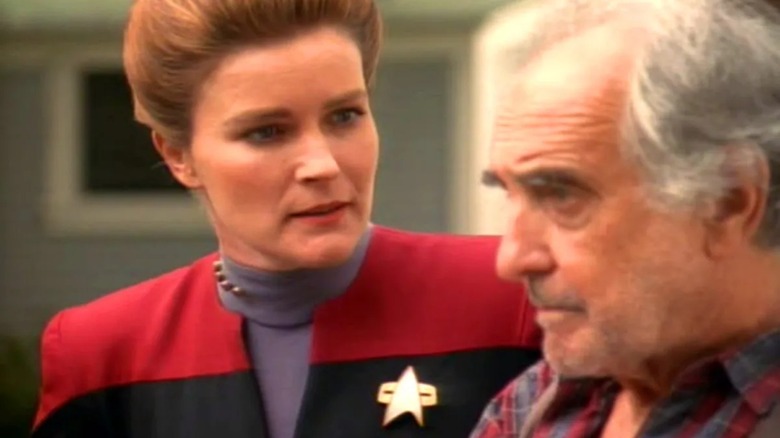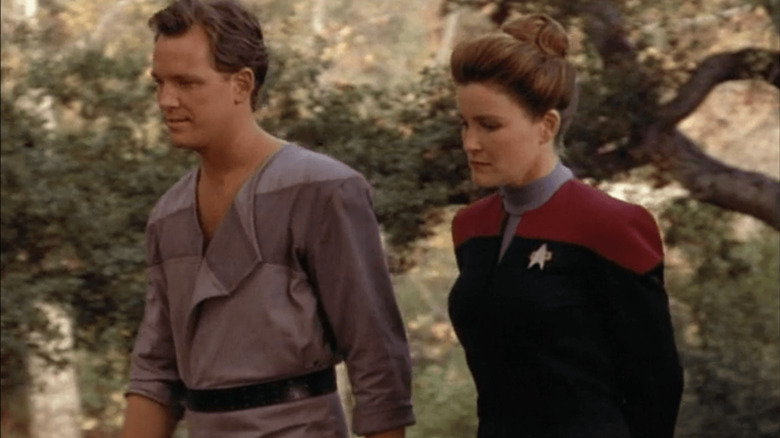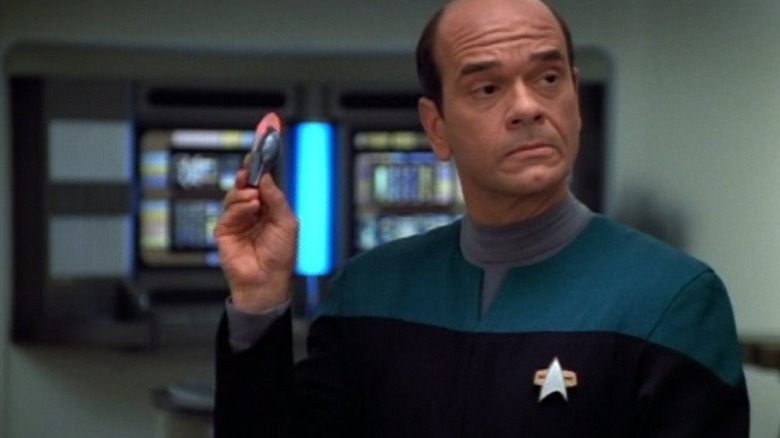How Bill Clinton Helped Shape Star Trek: Voyager Season 1
"Star Trek: Voyager" entered its early stages of production in 1993. Meanwhile, "Star Trek: The Next Generation" was filming its seventh and final season, and "Star Trek: Deep Space Nine" was working on its second. 1993 was an optimistic time in the U.S. The Gulf War had wrapped, Bill Clinton had been elected president, and the economy was booming. Yes, there were certainly still massive problems with the country, but for a brief span, it felt like the nation was at peace.
Of course, one only needs to look at the pop media of the 1990s to see how much angst there still was in the lurking in hearts of the people. '90s pop music often described the injustices of a racist police state, or how much people felt marginalized and dismissed. '90s media was also self-reflexive, pointing out that the old-world tropes and genres no longer worked. Deconstruction was necessary. It's no wonder that cynical satires like "The Simpsons" and "Married... with Children" were such bug business at the time.
This sticky blend of optimism and pessimism undergirded "Star Trek: Voyager," which debuted on January 16, 1995. "Voyager" was optimistic in that it was "Star Trek" and continued to sell the franchise's usual ideas of a technology-based utopia supported by a diplomatic, multicultural philosophy. "Voyager" was also pessimistic in that it stranded its main characters 70 years away from Earth. They had all their hope, but they were stuck.
The idea of being "far from home" was presented as a metaphor by "Voyager" co-creator Michael Piller. In the oral history book "Captains' Logs: The Unauthorized Complete Trek Voyages" edited by Mark A. Altman and Edward Gross, Piller talks about that metaphor and how it was born of the politics of mid-1990s America.
Voyager spoke to the problems of the Clinton administration
Piller, perhaps frustratingly, isn't specific about which societal problems he was referring to, but he did mention that it would take multiple generations to solve them. Piller might have been referring to environmental problems, but could just as easily have been talking about the damage done during the Reagan administration. He also might have been thinking about racism and racial injustice, as the Los Angeles riots had taken place just a few years before. Whatever the reason, Piller saw the voyage of the Voyager as a journey "back" to something we had lost. In his words:
"When we hooked on this idea we realized, in a sense, we were talking about a journey that is very much like the journey that all of us in this country are embarking on today. [...] We were sort of in the afterglow of the last presidential election and it seemed clear the kind of problems that this country is facing are not problems that are going to be easily solved in our lifetime. We have to begin on solutions that may take more than one generation to see the final result of."
The premise of "Voyager" was that the ship was going to take 70 years to get back to Earth after being instantaneously whisked across the galaxy by a godlike alien. There was a very real possibility that the current residents of the Voyager would die of old age before returning. It was, at least when it debuted in 1995, seemingly going to be an intergenerational series. A new generation would have to step up and keep doing the hard work so that a long-term project could be fulfilled.
The show's creatives knew Voyager might not have a happy ending
Piller continues, explicitly:
"In a sense, the ship franchise of 'Voyager' is that kind of journey, because we are on a ship of men and women who are beginning a journey that conceivably we may not see the end of — and we are working in the best interests of everybody on board to try to solve our problem and to make the best life we can for ourselves on this ship; to find the way back home."
What is interesting about Piller's statement is how pessimistic he seemed to feel about the future and, by extension, the quest of the U.S.S. Voyager. In the year 2024, we know that "Voyager" ran for seven seasons and that the ship did indeed make its way home in that time. In 1995, though, Piller seemed to feel that the Voyager might not make it. He felt that a futile sense of loss permeated the series:
"But in the end [...] we realize we may have lost what we really love forever and that the journey back is 70 years, even at our best speed. The bottom line is that we felt that this was a very contemporary kind of message to be dealing with."
Again, Piller doesn't say what specifically the modern U.S. had lost, but something was gone and wouldn't easily be regained. Piller then went on to say that being "lost in space" allowed for new creative opportunities for him and his fellow "Voyager" creatives.
In the seven years "Voyager" was on the air, Captain Janeway (Kate Mulgrew) became increasingly authoritarian, forcing others to abide by her strict family-like version of Starfleet rules ... which she flouted often. Perhaps Piller knew that war and fascism lay ahead.


